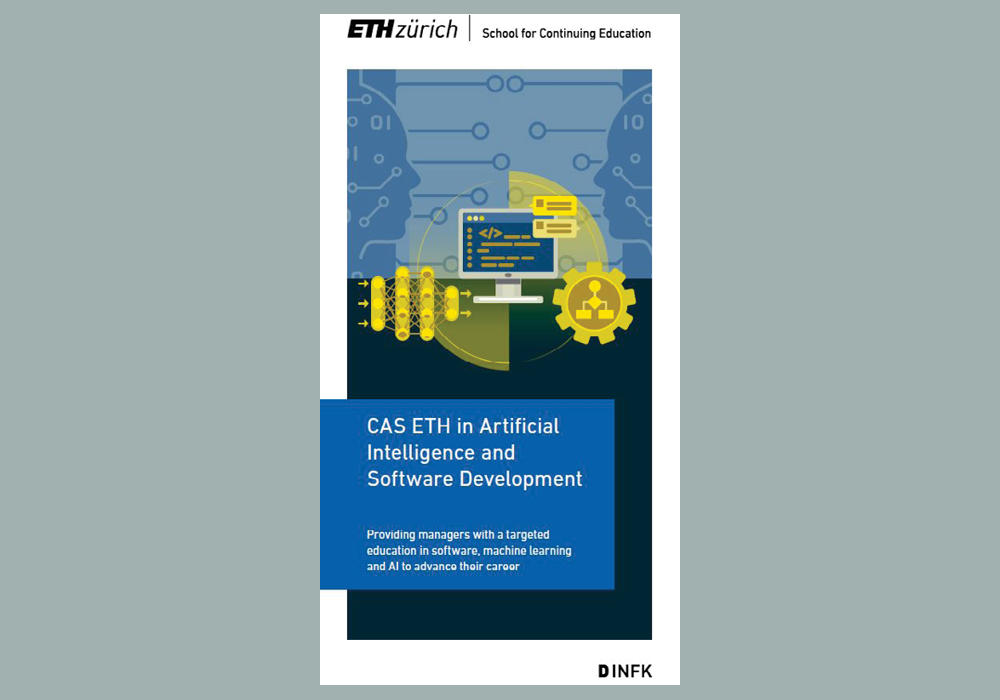CAS ETH in Artificial Intelligence and Software Development

The CAS AIS provides a targeted education in software, machine learning (ML) and artificial intelligence (AI) to managers without prior formal training in computer science in order to advance their career.
Organisations are changing rapidly to become more digital. At the centre of this transformation is the use of software and machine learning to generate novel business applications. Increasingly, these involve AI. Managers without any formal training in these areas are being asked to make critical resource allocation and operational decisions related to software and AI that can have significant impacts on corporate competitiveness. The risks and rewards of this decision making have never been higher. This is where the CAS in AI and Software Development comes in.
The aim of this programme is to improve the decision-making of managers by providing them with fundamental training in ML, AI and software development that is applicable across multiple industries and areas of the organisation.
Modules
Programming with Python – Dr. Lukas Fässler & Dr. Markus Dahinden
This Python course reinforces and extends basic programming concepts covered previously in the CAS in Applied Information Technology and introduces several new topics. These include classes, objects, and a selection of important Python libraries, such as NumPy for matrix calculations as well as Pandas and Requests for data science and data visualisation. Participants will develop their Python programming skills over the entire CAS with online tutorials, programming exercises, and one-on-one support.
A Python basics online course is available approximately one month prior to the start of the programme for people who do not have any prior experience with Python or who would like to refresh their Python skills.
Software Engineering Fundamentals – Dr. Malte Schwerhoff & Dr. Hermann Lehner
This course provides a comprehensive overview of the software development process, introducing participants to essential techniques for facilitating the delivery of high-quality software products. The knowledge and practical experience gained will help managers to improve communication with software development teams, ultimately leading to higher success rates.
We will examine the different stages of software development and lifecycle to better understand the challenges of managing software development projects, and the principles and processes used to address them. This will include topics such as requirements elicitation, modelling, design patterns, implementation decisions and trade-offs, testing, refactoring, and maintenance and enhancement of software products. A team project will give participants the opportunity to apply the techniques introduced and to experience common software development challenges first-hand: for example, difficulties in eliciting technically meaningful requirements, integrating change requests, and managing an evolving code base. In this course, we will reverse the roles: participants will take on the task of delivering high quality software under our supervision. In this way, participants will gain a deeper understanding of the challenges of software development.
Building ML/AI Applications – Dr. Carlos Cotrini Jiminez & Dr. Andreas Streich
This course provides fundamental training in areas of machine learning that are reshaping industries. We explain technical concepts in simple terms and no previous experience with ML is expected.
We will cover the following topics:
- Introduction to Machine Learning: Understand the essentials of ML and its core tools like decision trees, neural networks, and cross-validation.
- Deep Learning: Discover the transformative role of neural networks, with an emphasis on natural language processing. We study applications like machine translation and chatGPT.
- Applications: Learn how ML is revolutionizing sectors like finance, insurance, retail, and services.
- Challenges & Considerations: Recognize the potential pitfalls, threats, and ethical considerations in deploying ML.
- The Future of AI: Engage in discussions on the societal impacts and future prospects of AI.
Participants complete 3 modules over 14 weeks. Courses are generally conducted in either a block format or blended learning format to minimize time away from work. Classes are held at ETH Zentrum campus every other week for one full day (Friday) and one half-day (Saturday morning) and, thus, this CAS is well suited as a part-time study programme.
Workload is approximately 250 hours.
Study language is 100% English.
CAS AIS applicants must satisfy the following requirements:
- ETH recognised university degree at Master level or equivalent educational background
- Demonstrated managerial experience
At least 5 years of professional work experience, including some experience with allocation of corporate resources, e.g. line management, project management, etc. - Good knowledge of English
At least B2 level is recommended.
Prior completion of the CAS in Applied Information Technology (CAS AIT) is encouraged, but not required. Basic Python programming experience is recommended. An online refresher in Python basics will be available approximately one month before the CAS program begins.
Applications will be reviewed by the Admission Committee. The final decision is communicated by the School for Continuing Education.
Please apply online through the School for Continuing Education website. After submitting the application and uploading supporting documentation, you will be asked to pay the application fee.
Deadline: 30 November
Contact
ETH Zurich
Department of Computer Science
Andreasstrasse 5
OAT Z 22.1
8092
Zurich
ETH Zurich
Rämistrasse 101
HG E 17-18.5
8902
Zurich

